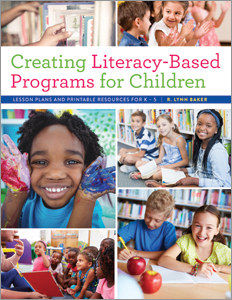Primary tabs
You don't need to be an ALA Member to purchase from the ALA Store, but you'll be asked to create an online account/profile during the checkout to proceed. This Web Account is for both Members and non-Members.
If you are Tax-Exempt, please verify that your account is currently set up as exempt before placing your order, as our new fulfillment center will need current documentation. Learn how to verify here.
- Description
- Table of Contents
- About the author
- Reviews
The all-in-one resource you've been clamoring for, this book presents a comprehensive package of literacy-based public library programming ideas designed for children in kindergarten through the early tweens. Chock full of strategies and best practices for promoting literacy and reading skill development, it also features numerous planning templates and other materials ready to print and adapt as needed. With specific guidance for improving and streamlining each step of program planning and implementation, this book
- defines literacy and reading skills by grade levels, in addition to information on other developmental stages;
- explains multiliteracies and connects them to programming practices;
- provides step-by-step program planning guides, arranged by grade level, which include book-based programs, clubs, makerspaces, afterschool/study programs, author/guest visits, family/all age programs, impromptu programming, and many others;
- offers STEAM-based programs which connect to science, technology, engineering, art, and mathematics;
- gives advice on collaborating effectively with school librarians and teachers to plan school field trips;
- addresses large event and summer reading program planning;
- shows how to program for children with special needs; and
- shares tips and suggestions for getting the word out through advocacy and marketing.
Helping public libraries build outstanding programs from the ground up, this resource will prove valuable a tool for children's librarians and other programming staff.
Check out this book’s Web Extra now!
Chapter 1 Literacy and Reading Skills by Grade and Developmental Stages
Chapter 2 Multiliteracies Defined
Chapter 3 What Is Programming?
Chapter 4 Types of Programs
Chapter 5 Program Planning
Chapter 6 Specialized Group Programs and Outreach Services
Chapter 7 Large Event and Summer Reading Program Planning
Chapter 8 Programming for Children with Special Needs
Chapter 9 Advocacy and Marketing Your K–5 Programs
Chapter 10 Lesson Plans
Appendix Handouts and Resources
Index
R. Lynn Baker
R. Lynn Baker is the author of Counting Down to Kindergarten: A Complete Guide to Creating a School Readiness Program for Your Community and Creating Literacy-Based Programs for Children: Lesson Plans and Printable Resources for K-5. With a background in early childhood education and library programming for children, Baker provides training to early childhood educators and librarians. She holds her bachelor’s in Interdisciplinary Early Childhood Education; a trainer’s credential; and her Master’s in Library and Information Science. Baker is an adjunct professor for Northern Kentucky University, teaching Library Programming for Children.
"Comprehensive ... A valuable programming tool."
— School Library Journal
"Baker’s passion for reading readiness and innovative services to K-5 children is abundant throughout this streamlined and practice-based volume ... New professionals will appreciate the book’s brevity and practicality as they discover and hone their programming skills. I would highly recommend the volume to university professors whose course offerings include program design for children in public libraries. Baker’s work is likely to be instrumental in sharpening students’ skills before they find themselves tasked with developing a programming repertoire at their own library."
— Reference & User Services Quarterly



